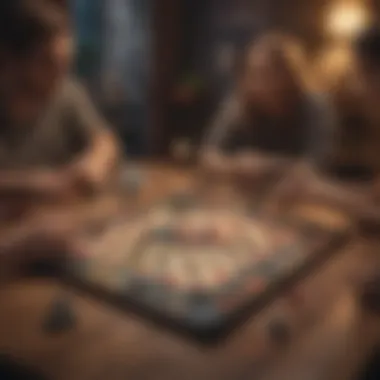Engaging Games That Foster Social Connections


Intro
In today’s fast-paced world, the art of social interaction can often feel like it’s dwindling. People might bump into each other on busy streets but miss the chance to connect meaningfully. Yet, games present a unique opportunity to break the ice and foster relationships. Whether it’s through an evening spent over a classic board game or teaming up online for a multiplayer adventure, the shared experiences they create cannot be overstated.
This article dives into the myriad games available that serve as catalysts for social interaction. We will explore timeless classics, modern digital experiences, and interactive outdoor activities. By weaving together personal anecdotes and insights, we aim to illuminate how these games are not mere distractions, but powerful tools for building connections and sense of community.
Game Reviews
Board Games: Settlers of Catan
One staple in many game nights is Settlers of Catan. This game encourages players to trade resources as they develop settlements and cities on a modular board.
- Overview of the game: Settlers of Catan is played on a board representing an island made up of different terrains, each producing different resources. Players strategize as they gather resources, build roads and settlements, and create trade partnerships.
- Gameplay mechanics and features: The luck of the dice plays a role, but strategic trading is key to winning. Players must balance building their own settlements while negotiating with others, which can spark engaging dialogue.
- Graphics and sound quality: Though the graphics are simple, the colorful board and vibrant pieces generate a visually appealing atmosphere. Sound isn’t an aspect in this game, but it’s all about the interactions.
- Pros and cons analysis: A significant pro is its ability to foster communication and negotiation among players. However, some may find it can lead to player frustration if they are consistently blocked or unable to gather needed resources.
Digital Multiplayer: Among Us
Among Us burst onto the scene and became a phenomenon during the pandemic, allowing players to engage with friends or strangers around the world.
- Overview of the game: Set in space, players either become Crewmates or Impostors. Crewmates complete tasks, while Impostors aim to sabotage them.
- Gameplay mechanics and features: The thrill comes from deceit and deduction, where players must discuss and vote out whom they believe the Impostor is. Conversations are lively and often filled with banter.
- Graphics and sound quality: Its simple 2D graphics make it accessible, and the light-hearted sounds add to the charm.
- Pros and cons analysis: The game serves as an excellent platform for chatting and joking around, but it can become chaotic if players take the roles too seriously, leading to tension.
Tips and Strategies
Beginner's tips for new players
For newcomers to gaming or specific titles, it’s often a bit intimidating. Remember to take it slow. Observe your friends or fellow players, understand the rules, and gradually immerse yourself into the game's dynamics.
Advanced strategies for experienced gamers
Once you're familiar, you can adopt various strategies. For instance, practicing negotiation skills in Settlers of Catan not only enhances your chances of winning but makes you an intrinsic part of the group's social dynamic.
Hidden secrets and Easter eggs
Many games, especially digital ones, contain hidden features. Exploring these can spark more discussions and shared joy with friends. Keep an ear to the ground on forums or social media platforms like Reddit.
Updates and patches overview
Stay updated on game patches and new features, which can often change gameplay dynamics. Understanding these can offer you an edge in discussions and strategies.
Community Engagement Strategies
Engaging with the community can significantly boost your gaming experiences.
- Join forums: Websites like Reddit provide valuable discussions around strategies, tips, and hidden features.
- Organize game nights: Whether in-person or online, hosting a game night fosters community and can lead to new friendships.
- Utilize social media: Platforms like Facebook allow you to connect with like-minded individuals who share your passion and can offer new recommendations.
What emerges through all these interactions is the heart of the matter—games provide more than just entertainment; they nurture relationships and forge new connections, making them integral to our social fabric.
Prelude to Social Gaming
In today's interconnected landscape, the notion of gaming transcends entertainment; it serves as a dynamic platform for social engagement among individuals. This section delves into the essence and significance of social gaming, focusing on how games become bridges that connect people of varied backgrounds. Whether they’re played in the living room, on a gaming console, or out in the open air, games offer shared experiences that can strengthen relationships and foster a sense of community.
Understanding the Role of Games in Social Interactions
Games have a profound impact on how we interact, often functioning as icebreakers or catalysts for deeper interaction. They possess an unparalleled ability to bring people together, even in the face of differences. As players engage in various activities, they often share laughs, celebrate wins, and bond over losses.
For instance, gathering around a board game like Catan or diving into a multiplayer online battle like Fortnite provides common ground. The friendly competition can lead to camaraderie, and players find themselves discussing strategies, character builds, and personal anecdotes, helping to forge connections that run deeper than the competition itself.
Moreover, games stimulate communication and teamwork. Many require players to collaborate to achieve victory, reinforcing the notion of working side by side towards a common goal. This blending of strategic thinking and social interaction increases the depth of relationships formed through play.
The Evolution of Games as Social Tools
Historically, games have evolved from simple pastimes into sophisticated social tools that create immersive experiences. From the humble beginnings of chess—a game that has challenged minds for centuries—to the expansive worlds offered by today’s online role-playing games, the transformation is remarkable.
In the early days, social interaction occurred in local environments, from living rooms to community centers. However, the advent of the internet redefined how we view gaming. Online platforms allow people from different continents to engage, strategize, and form groups or guilds based on shared interests. This transformation has led to the emergence of communities focused on gaming, where individuals transcend geographical boundaries to create meaningful connections.
One notable example is Discord—an online communication platform designed for gamers that has become a virtual hub for communities. Whether discussing strategies, sharing funny moments, or building friendships, Discord exemplifies how modern gaming acts as a conduit for social interaction. The advent of mobile gaming, too, has contributed to this evolution; now, anyone can connect and compete on the go, breaking the chains of traditional gaming.


In summary, the journey of games as social tools illustrates their continuing relevance. They are not just about winning or losing; they’re about forging connections, exploring new relationships, and creating shared memories that can last a lifetime.
Traditional Board Games
Traditional board games have been the backbone of social interaction for centuries. They serve as a catalyst for connection, allowing players to engage with each other in both competitive and collaborative environments. Board games bridge gaps between generations, cultures, and backgrounds, providing a unique platform where stories are shared and laughter echoes. Moreover, these games foster critical skills such as critical thinking, patience, and teamwork, making them an essential element in the landscape of social gaming.
Characteristics of Classic Board Games
Classic board games bring a sense of nostalgia while remaining relevant today. They often feature simple rules yet offer a depth of strategy that can be appreciated by players of different skill levels. Here are some key characteristics:
- Physical Components: Most classic board games include tactile elements such as pieces, dice, and boards, creating a multi-sensory experience.
- Face-to-Face Interaction: Players gather around a table, encouraging direct eye contact and communication, which enhances social bonds.
- Turn-Based Mechanics: These games typically have turn-based play, allowing everyone to engage in the game at their own pace and facilitating strategic conversations.
- Universal Themes: Common themes such as competition, resource management, or adventure make these games appealing to diverse audiences.
In essence, classic board games create a space where players can think, strategize, and socialize simultaneously.
Popular Choices for Group Play
When it comes to group play, certain board games have stood the test of time and gained popularity across various demographics. Some noteworthy mentions include:
- Monopoly: This classic game revolves around property trading and strategy, often leading to heated negotiations and intense gameplay.
- Settlers of Catan: Known for its emphasis on resource management and trading, this game requires players to negotiate and collaborate, thus enhancing social interaction.
- Scrabble: A perfect blend of competition and language skills, Scrabble allows players to engage in wordplay while battling for points.
- Codenames: A great game for larger groups, where teams work to guess words based on clues given by their teammates. The need for effective communication adds excitement to the gameplay.
These games hold the power to enlarge one's social circle, offering shared experiences that can be cherished.
Strategic Board Games for Advanced Gamers
Strategic board games cater to a more seasoned audience, often requiring in-depth planning and complex decision-making. Such games naturally foster intense discussions and friendly rivalries. A few notable titles are:
- Terraforming Mars: Players act as corporations working to make Mars habitable, requiring long-term strategies and adaptability.
- Twilight Struggle: This two-player game simulates the political and military tensions of the Cold War, demanding foresight and tactical maneuvering.
- Gloomhaven: A campaign-driven game that combines RPG elements with tactical combat, challenging players to work as a team while developing their own characters and strategies.
As these games unravel, players immerse themselves in a world that demands cooperation, cunning, and sometimes, competitive spirit.
"Board games are a timeless way to build connections and create memories that last a lifetime."
In summary, traditional board games continue to be a vital aspect of social engagement, transcending entertainment to become tools that foster community and interaction. Their enduring appeal and various options make them an attractive choice for gamers of all ages, ensuring they remain a relevant part of our social fabric.
Digital Multiplayer Gaming
Digital multiplayer gaming has really transformed the way people connect. It's not just about scoring points or defeating enemies anymore; it's about creating bonds and forming communities. Whether you're hustling through a hectic dungeon with friends or racing against each other on virtual tracks, these platforms provide shared experiences that often enrich relationships beyond the screens.
Online Platforms for Social Gameplay
Today, there is an endless range of online platforms that cater to social gameplay needs. Websites and applications like Steam, Twitch, and Discord have become essential hubs for gamers. These platforms offer opportunities not just to play but to interact meaningfully.
- Steam: This platform is more than just a gaming library; it creates an ecosystem allowing friends to play together, chat via text and voice, and share game experiences. The community features foster connections between gamers who might have never met otherwise.
- Twitch: Initially a streaming service, Twitch has evolved into a social platform where fans can engage in real-time discussions during live gameplay. Viewers can form friendships over shared interests, deepening their social interactions beyond simple gaming.
- Discord: This chat application is a game changer, offering dedicated servers for various games, hobbies, or interests. It's a place where players talk strategy, share memes, or simply hang out while playing games together. The ease of communication has definitely made it a favorite zone for many gamers.
In these digital hangouts, people from divergent backgrounds find common ground. They form bonds over shared interests.
Cooperative vs. Competitive Gaming Dynamics
The dynamics of multiplayer gaming can be broadly categorized into cooperative and competitive gameplay. Each type plays an important role in shaping social interactions and personal connections.
- Cooperative Gaming encourages teamwork. Players often have to work together to achieve a goal, creating camaraderie. Games like "Among Us" or "Minecraft" promote communication and joint strategy. Teams must trust each other and share resources. This collaboration fosters lasting friendships and teamwork skills.
- Competitive Gaming, on the other hand, can spark friendly rivalries. Titles like "League of Legends" and "Fortnite" require players to engage in competition against each other. Such experiences can lead to banter, friendly trash talk, and a sense of belonging to a community. These gaming environments often lead to deeper relationships built on mutual understanding and appreciation of each other's skills.
A survey showed that players who engage in both types find a balance, leading to well-rounded gaming experiences and relationships.
The Rise of Mobile Multiplayer Games
Mobile gaming has exploded over the last few years, drawing in gamers from all walks of life. With games like "Fortnite" or "Call of Duty: Mobile," players can connect anytime, anywhere. This has expanded the social aspect considerably, as it’s easier for groups to gather for quick matches without the need for dedicated consoles or high-end PCs.
- Accessibility: Mobile devices are ubiquitous. This means nearly anyone can jump into a game, facilitating interactions among friends who might have otherwise not crossed paths.
- Simplicity: Mobile games typically require less commitment than traditional gaming. A quick round in “Among Us” during lunch breaks might lead to sharing plans for weekend game nights.
- Social Features: Many mobile games come with integrated chat and social features. Therefore, these platforms allow for instant communication and bonding, enhancing the overall gaming experience.
The rise of mobile multiplayer gaming isn't just a trend; it's a full-fledged movement that redefines how we engage with games and, by extension, each other in our daily lives. This approach encourages connections that often extend far beyond the games themselves.
"Gaming isn’t just about playing; it’s about building relationships and growing communities that last beyond individual games."
Outdoor and Physical Games


Outdoor and physical games play a crucial role in social interaction, offering unique opportunities for individuals to bond, build community, and develop social skills. Unlike their digital counterparts, these games often require participants to engage in face-to-face interaction, promoting not only physical activity but also deeper connections. Through shared experiences in a natural environment, players can break down barriers, improve communication, and cultivate trust, making outdoor games an essential element of social engagement.
Team Sports as Social Engagement Activities
Team sports are a cornerstone of social connectivity in outdoor settings. Whether it's basketball, soccer, or ultimate frisbee, these sports encourage participants to collaborate towards a common goal. They foster an environment where teamwork thrives, allowing individuals to learn how to communicate effectively, strategize, and support one another. When playing team sports, players often feel a sense of belonging, as they are working towards a shared victory.
- Physical Benefits: Engaging in team sports promotes fitness, coordination, and overall well-being.
- Social Benefits: By participating in these activities, individuals build friendships, learn to manage conflicts, and practice leadership skills.
Moreover, the inclusive nature of team sports allows individuals of diverse backgrounds and skill levels to come together, making it very engaging and accessible.
"Team sports turn strangers into teammates and teammates into friends."
Group Challenges and Team-Building Exercises
Group challenges and team-building exercises take social engagement to the next level. Unlike traditional sports, these activities focus on collaboration and problem-solving in a more relaxed setting. Examples include obstacle courses, scavenger hunts, and trust falls. Such exercises are specifically designed to strengthen relationships among participants by encouraging teamwork and communication.
Consider a scavenger hunt that requires teams to solve riddles and find hidden items. Through this common endeavor, players develop problem-solving skills while bonding over shared objectives and light-hearted moments. The dynamic often leads to laughter and memories, deepening friendships that can extend well beyond the playground.
- Shared Experience: Completing challenges alongside others engenders unity and camaraderie.
- Skill Development: Participants also cultivate essential life skills such as critical thinking, resilience, and adaptability.
Strategies for Organizing Outdoor Game Events
To harness the benefits of outdoor games, organizing events with clear objectives and strategies is vital. Here are some considerations:
- Set Clear Goals: Determine what you want to achieve. Is it for fun, building camaraderie, or promoting health?
- Choose the Right Venue: Select a location that can accommodate your chosen activities. Parks, fields, and community centers work well.
- Include Everyone: Ensure that activities are inclusive and cater to different skill and fitness levels.
- Plan for Logistics: Consider necessary equipment, safety measures, and refreshment options.
- Foster an Engaging Environment: Create a warm atmosphere that encourages participation and connection.
By implementing these strategies, organizers can create memorable outdoor game events, ultimately enhancing the social fabric of the community.
Through regular participation in outdoor and physical games, individuals not only enjoy physical activity but also reap significant social benefits, making it an essential element for fostering connections among diverse groups.
Party Games for Social Gatherings
Party games play an essential role in social gatherings by creating an atmosphere that encourages connection and interaction among participants. They can bridge the gap between strangers, build camaraderie, and serve as a pathway for conversations to flow. These games not only fill the silence in moments of awkwardness but also enhance the overall experience of an event, transforming a mundane gathering into an unforgettable occasion. When planning any social event, choosing the right party games can make all the difference.
The Concept of Party Games
Party games are designed with the intention of engaging a group of people in fun, light-hearted activities. Typically characterized by simple rules and minimal setup, these games can accommodate a wide range of players, making them suitable for both large and small gatherings. The essence of party games lies in their ability to foster inclusivity—everyone can join in, regardless of skill level or prior experience.
At their core, party games encourage laughter and facilitate conversations, allowing individuals to let their guards down and interact in a relaxed environment. This community aspect can be particularly important for parties with diverse guest lists, where mingling might not come naturally.
Interactive Games that Break the Ice
Some party games focus specifically on breaking the ice. These games are crafted to make participants feel comfortable, especially when mingling with new acquaintances. For example:
- Two Truths and a Lie: Each person shares three statements about themselves, two being true and one false. Others guess which is the lie, prompting shared stories and laughter.
- Charades: A classic choice where players act out words or phrases without speaking, encouraging non-verbal communication and plenty of giggles.
- Pictionary: Similar to charades but with drawing involved, this game unleashes creativity and gets the competitive spirit going.
When these interactive games are introduced early in gatherings, they help break down barriers, making it easier for everyone to engage.
Evaluating the Success of Party Games
Measuring the effectiveness of party games often requires taking a step back and observing the reactions and interactions among participants. Several factors play into what makes a party game successful:
- Participant Engagement: Are guests actively participating, or do they seem disengaged? High levels of laughter and interaction are signs of a successful game.
- Inclusivity: Does the game allow everyone a chance to join in? Games that involve all players tend to foster a sense of togetherness.
- Sustainability: Can the game continue? Games that can be played multiple times or have variations keep guests entertained longer.
Success isn’t merely measured in laughter—it’s also reflected in lasting connections made during gameplay.
Ultimately, the right party games can significantly enhance the social fabric of gatherings. By selecting games that fit the mood and size of the gathering while ensuring opportunities for interaction, hosts can create an environment where everyone walks away feeling connected and engaged.
Role-Playing Games and Collaborative Storytelling
Role-playing games (RPGs) hold a unique place in the spectrum of social activities. More than just a pastime, they create spaces where players can immerse themselves in alternate realities, crafting narratives collaboratively and learning to navigate complex social dynamics. These games tap into our inherent need for connection and expression, allowing individuals to bond over shared experiences irrespective of their backgrounds.
Foreword to Role-Playing Experiences
Role-playing experiences often serve as a canvas for imagination. In these sessions, players assume specific characters, each with distinct traits and backgrounds. This practice of stepping into someone else's shoes can promote empathy, as participants explore diverse perspectives and narratives.


For instance, consider a simple tabletop RPG session where players traverse the dark forest of Eldergrove under the guidance of a game master. Players are not just rolling dice but also engaging in dialogues, making decisions that affect their group, and collaboratively driving the story forward. Whether it’s the gallant knight or the cunning rogue, each character brings a flavor that enriches the storyline, making every meeting with friends a unique experience of creativity and social interaction.
In RPGs, the mechanics often encourage teamwork. Players learn the value of communication and strategy, honing these skills as they overcome obstacles together. Role-playing mechanics such as spell-casting or combat scenarios require players to debate actions and negotiate roles—an excellent opportunity for enhancing interpersonal skills in a fun environment.
Building Community Through Role-Playing Games
Beyond personal enjoyment, RPGs play a pivotal role in community building. They draw people from different walks of life into a shared space, fostering camaraderie around shared goals. This communal aspect extends beyond the gaming table—many players form lasting friendships that continue off-game.
- Collaborative Storytelling: This aspect allows players to weave their narratives, turning games into shared literature. Noteworthy tales emerge from group dynamics, enhancing creativity.
- Inclusion and Diversity: RPGs often create platforms for representation, where varied characters reflect a wide range of cultures, genders, and identities. This inclusivity nurtures a richer community dynamic, as players can bring their own life experiences into the magic of collaborative storytelling.
- Ongoing Engagement: Regular sessions can cultivate a sense of belonging. Game groups often become tight-knit communities, where members share life experiences, support each other, and celebrate achievements during and after their gaming adventures.
In essence, role-playing games do more than entertain; they provide frameworks for emotional connection and understanding, all while enveloping players in riveting stories. By exploring these imaginative realms together, participants not only discover more about their characters but also about themselves and each other.
Cognitive and Strategic Games
Cognitive and strategic games play a significant role in fostering social interaction. They engage players not just at a surface level, but also demand mental agility and comprehensive planning. This kind of engagement has the potential to sharpen analytical skills while simultaneously working to enhance social bonds. When players come together to tackle these challenges, they often have discussions, make collective decisions, and learn from each other in a meaningful way. Beyond mere competition, these games become a vehicle for collaboration, creating connections that can last well beyond the gaming session.
The Importance of Strategic Thinking
Strategic thinking is akin to having a mental toolkit ready to solve complex puzzles. In cognitive games, players must think several steps ahead, much like a chess master plotting their next move. This kind of foresight doesn't simply apply to the game; it spills over into real-world scenarios, influencing how individuals approach problem-solving in daily life. Players learn to weigh risks, anticipate the moves of others, and adapt their strategies as the landscape of the game shifts.
- Benefits of Strategic Thinking:
- Encourages adaptability and flexibility.
- Improves decision-making capabilities.
- Fosters patience and foresight by evaluating consequences.
- Inspires a collaborative spirit when discussing strategies with teammates.
Underneath it all, strategic thinking reinforces the idea that every choice matters and that collaboration forms the bedrock of successful outcomes, nurturing a sense of community among players, even competitive ones.
Games that Challenge the Mind
There’s a diverse array of games specifically designed to challenge cognitive skills and stimulate strategic thought. From intricate board games to engaging digital experiences, the choices are endless.
"Games are a form of art and communication that transcend barriers and create communities."
- Some notable examples include:
- Catan: This game blends resource management with social negotiation, forcing players to interact and make alliances.
- Pandemic: A cooperative game where players work together to save the world from diseases; success hinges on strategic cooperation.
- Chess: A classic game that requires deep strategic thinking, often considered the epitome of cognitive challenge.
- Ticket to Ride: Players build train routes while also strategizing their connections, naturally sparking discussion and debate in a race to complete their routes.
These games not only entertain but require focus and critical thinking, which can lead to stimulating conversations. Each game differs in style, but they all offer players a chance to flex those cognitive muscles, ensuring the experience is not only social but intellectually enriching as well.
End: The Impact of Games on Social Behavior
In understanding the intricate relationship between games and social behavior, it becomes evident that games serve as more than merely entertainment; they act as powerful connectors among individuals. As we’ve traversed through various types of games, from traditional board games to engaging digital experiences, the common thread remains clear: games facilitate interpersonal connection. With the rise of social dynamics in gameplay, it’s crucial to recognize the implications these games have beyond the screen or tabletop.
Games often invite people into shared experiences, breaking down barriers and creating communities. They encourage communication, foster teamwork, and help to establish trust between players. These aspects can resonate not just during play but can influence daily interactions long after the game has ended. By facilitating moments of joy, competition, and collaboration, games enable connections to flourish in ways that simple conversations may not achieve. Here are some key points to consider:
- Social Skill Development: Games can enhance critical social skills including negotiation, persuasion, and conflict resolution, valuable in both personal and professional spheres.
- Shared Experiences: They create unique memories that strengthen relationships among friends, families, and even strangers. An evening playing a classic board game can lead to stories recounted for years.
- Inclusion and Diversity: Many games now are designed to promote inclusion, providing opportunities for diverse groups to engage meaningfully, nourish empathy, and break down social norms.
"Games have this uncanny ability to bring people together, regardless of background. You find common ground and understanding through simple play."
Moreover, the impact of games on social behavior is also seen in the strategies used to develop new titles aimed at fostering communication. Game designers are increasingly aware of the power their creations wield in shaping social behavior, thus placing an emphasis on kind of games that promote constructive social interactions.
With all these benefits, it is worth considering how these interactions enrich our lives, helping us navigate the complexities of human relationships. As we lean into the future, the role games play in our social fabric is set to expand further.
Games as Catalysts for Connection
At the core of social engagement lies the ability of games to act as catalysts for connection. Engaging in a game minimizes the pressure often felt during traditional conversations. Instead, players can bond over shared challenges, laughter, and even occasional frustration. Many people have found that these interactions lead to lasting friendships, as games cultivate an environment where participants feel safe to express themselves more openly.
Different types of games encourage varying styles of communication. For instance, cooperative games like Pandemic or Catan revolve around teamwork, while competitive games like Chess or Mario Kart often incite lively discussions about strategy or playful rivalries. These multifaceted interactions shape social dynamics in nuanced ways, making games effective tools for networking and relationship building.
- Team-based Dynamics: Cooperative games offer players a chance to work towards a common goal, thereby nurturing teamwork.
- Healthy Competition: Competitive games can spark engaging debates, broadening social circles through a shared passion for winning.
Ultimately, games create opportunities for people to engage in a relaxed manner, often leading to genuine connections that might not have been possible in a traditional context.
Future of Social Games in the Digital Age
As we stand on the brink of a new digital revolution, the landscape of social gaming is rapidly evolving. The future promises to bring even more interactive and immersive experiences, further enhancing the social interaction aspects of gaming. With technology paving avenues for greater accessibility—such as through virtual reality or augmented reality—players can expect richer connections that transcend geographical barriers.
It is essential to view these advancements as tools for building bridges among diverse populations. Digital platforms are increasingly designed to bring people together, meeting them ‘where they are’. Here are a few trends to look out for:
- Immersive Experiences: Virtual reality games allow players to inhabit a shared space, elevating the sense of presence and shared experience.
- Cross-Platform Playability: The rise of cross-platform gaming invites friends from different consoles or devices to play together, expanding social circles.
- Gamification of Social Events: Online platforms are experimenting with blending social events and gaming, such as virtual trivia nights or e-sports tournaments, making connections easier and more entertaining.
These developments highlight the importance of social gaming in fostering relationships. They signal a future where interaction can happen seamlessly, enriching lives in ways traditional forms of interaction may struggle to achieve. Embracing this shift allows us to ally with the evolving needs for social connection in a fast-paced, digital world.



